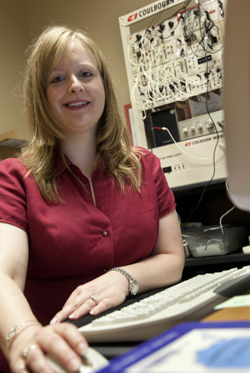 Dr. Jennifer PeszkaPsychology professor Dr. Jennifer Peszka remembers exactly when she became interested in sleep research. She will be the first to tell you she found her field very early.
Dr. Jennifer PeszkaPsychology professor Dr. Jennifer Peszka remembers exactly when she became interested in sleep research. She will be the first to tell you she found her field very early.
Peszka grew up in north Arkansas and graduated from Bergman High School near Harrison. A school career survey recommended the people-oriented Peszka pursue psychology.
Her older sister had a college guide and marked schools she thought Jennifer would like. Her research led her to Washington and Lee University in Virginia, which interested her because of the school’s psychology program and student-run honor code.
A self-described “typical college student who did not get enough sleep,” she was studying late one night when she noticed a poster promoting the National Sleep Foundation. The flyer featured a long list of unanswered questions about sleep.
“We’ve only been studying sleep scientifically for about 60 years,” she said, adding that many of the poster’s questions are still unanswered. “But it’s exciting to be able to say we don’t know.”
Nearly every psychology paper she wrote from that moment on dealt with sleep.
Looking for a summer research position, she called every sleep research lab in the country that was accredited by the National Sleep Foundation (there were about 100 at the time). She eventually found a program at Cornell Medical Center in New York.
“That was a really exciting summer,” she said. “I think it’s important to try out what you’re going to do. I discovered that not only was it as exciting as I thought it would be but even more … better than I imagined!”
For her senior project, she studied the circadian rhythms of Mongolian gerbils, which she would induce into seizures.
After graduating from Washington and Lee in 1994, she went to graduate school. At the time, there were only five schools with doctoral programs in psychology studying sleep. Her Cornell mentor recommended the University of Southern Mississippi. The program was full, but her Cornell mentor encouraged the graduate program’s director to meet her.
“I don’t know what changed his mind,” said Peszka, who now believes that her mentor was a persuasive advocate on her behalf. “But I believe in doing a good job for people when you have a chance to.”
Five years later, she joined the Hendrix faculty. All in all, it was a short road, she said.
“Everything went perfectly for me,” she said. “I discovered psychology in high school. In college, I found sleep research.”
In graduate school, she decided she wanted to teach.
“I did not think I would be a teacher at first,” she said. “Somewhere in college, I realized the stuff about psychology that most interested me was not clinical.”
She knew she wanted to teach at a liberal arts college too.
“A liberal arts college was my dream job,” she said. “I wanted to teach in an environment like that.”
Eighty job applications later, she was considering a job offer at another school when her phone rang. It was Dr. Tim Maxwell inviting her to interview for a new position at Hendrix.
“I knew Hendrix was great, and I love Arkansas, so that was definitely a draw,” she said. However, the deadline to decide on the other offer was approaching.
“When I was leaving on the airplane after the interview, I told him, ‘I need you to let me know tomorrow’.”
The next day she got an offer.
The timing was equally fortuitous for her husband Dr. David Mastin, whom she met in Mississippi and married in 2000 in Charleston, S.C. Mastin was offered a position teaching psychology at the University of Arkansas at Little Rock.
“We were extremely lucky,” she said.
In addition to her teaching and sleep research at Hendrix, Peszka served on the faculty committee that developed Your Hendrix Odyssey: Engaging in Active Learning, which was officially launched in 2005.
Prior to the launch of Odyssey, Peszka was able to secure an external grant to support one student research assistant for the summer. Other faculty members were offering hands-on learning experiences if they found funding.
“There were no guarantees … we couldn’t guarantee an experience for a student,” she said of Hendrix prior to the advent of Odyssey. “The school needed consistency in supporting those programs.”
The ability for students and faculty to apply – on a competitive basis – for Odyssey grants made that consistency possible.
“It made us consistent in offering opportunities for students because the things we were doing were now funded,” she said.
“It leveled the playing field too,” she said, explaining that students now have the opportunity to apply for financial support through Odyssey to pursue engaged learning projects, such as research, service, and international study.
She also saw “a big explosion of new things.”
“People who weren’t doing things before but had ideas were now getting funded,” she said.
It also made Hendrix the kind of place that national foundations such as the Lilly Endowment and the Andrew W. Mellon Center would support.
The breadth of project categories is a plus too.
“We stayed true to Hendrix by having all this flexibility in where it’s going to be,” she said of the six available Odyssey project categories from which students select their three projects.
One of the best parts of Odyssey is that every student is required to complete three engaged learning projects.
“It gets student to try things they wouldn’t have tried. It gives that push that sometimes students need,” she said. “Odyssey funds dreams and ideas and inspires experiences that are great.”
For more information on Dr. Peszka’s sleep research, visit http://www.hendrix.edu/news/news.aspx?id=52992